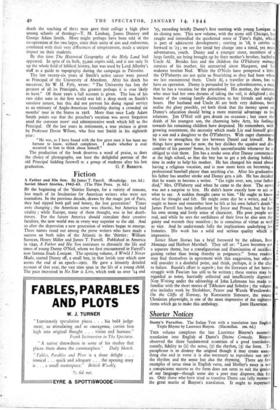Fiction
A Father and His Son. By James T. Farrell. (Routledge. ros. 6d.) Soviet Short Stories, 1942-43. (The Pilot Press. 3s. 6d.)
BY the beginning of the 'thirties Europe, for a variety of reasons, lost much of its fascination for American writers who were not journalists. In the previous decade, drawn by the magic pot of Paris, they had sipped both gall and honey, the lost generation! Times were changing ; the American scene was chaotic, but America had vitality ; while Europe, many of them thought, was in her death- throes. For the future America should stimulate their creative faculties, the new world was in every way superior to the old. And so after the depression a new generation of writers began to emerge. Three names stand out among the prose writers who have made a success on both sides of the Atlantic in the 'thirties : William Saroyan, Henry Miller and James T. Farrell. Published in America in 194o, A Father and His Son continues to chronicle the life and times of young Danny O'Neil, whom we first encountered in FarreU's now famous Studs Lonigan. The opening volume, A World I Never Made, started Danny off, a small boy, in that lavish year which now seems the end of an epoch-19n. He gave a leisurely detailed account of that year, the vast time span in the life of a young child. The pace increased in No Star is Lost, which took us over '14 and
'15, recording briefly Danny's first meeting with •young Lonigan as its closing note. This new volume, with the scene still Chicago, has caught and intensified the quickened sense of Time's flight, which is part of adolescent development ; starting in '18, it carries us forward to '23 ; we see the timid boy change into a timid; yet, more adventurous, youth. Danny and a younger sister, members of a large family, are being brought up by their mother's brother, bachelor Uncle Al. Besides him and the children the O'Flaherty menage consists of his mother, his unmarried sister Margaret, and his widower brother Ned. While the O'Neils have prospered a little, the O'Flahertys are not quite so flourishing as they had been when we last encountered them. Uncle Al, a traveller in shoes, has to have an operation. Danny is persuaded by his schoolmistress, a nun, that he has a vocation for the priesthood. His mother, the slattern, who once had her own dreams of taking the veil, is delighted ; she boasts of the coming family distinction to her friends and neigh- bours. Her husband and Uncle Al are both very dubious, both realise the glory possible, yet both think that the money spent on Danny's education should bring a more material advantage to his relations. Jim O'Neil still gets drunk on occasion ;. but since the death of his youngest son, the charming baby Arty, his feelings towards his remaining children have deepened. He remembers, with growing resentment, the necessity which made Liz and himself give up a son and a daughter to the O'Flahertys. With eager clumsiness he tries to strengthen the ties between Daniel and himself. But things have gone too far now, the boy dislikes the squalor and dis- comfort of his parents' home, he feels uncomfortable whenever he is obliged to visit them. Jim has a stroke soon after Danny commences at the high school, so that the boy has to get a job during holiday time in order to help• his mother. He has changed his mind about having a religious vocation, and 'is now more keen on becoming a
professional baseball player than anything ease. After his graduation his father has another stroke and Danny gets a job. He has decided
that he wants to become a writer. " Go right over, son, your father died," Mrs. O'Flaherty said when he came to the door. The news was not a surprise to him. He didn't know exactly how to act or what to say. A sudden thought came to him. " He ought to know what he thought and felt. He might some day be a writer, and he ought to know and remember how he felt at his own father's death." James Farrell has been influenced by Joyce and Proust, but he has his own strong and lively sense of character. His poor people are real, and while he sees the sordidness of their lives he also sees the gaiety and warmth they manifest ; he is conscious of virtue as well as vice. And he understands fully the implications underlying his histories. His work has a solid and serious quality which is impressive.
Soviet Short Stories has a brief foreword by the editors, Ivor Montagu and Herbert Marshall. They tell us: "Love becomes not a separate theme, but a transfiguration and illumination of sacrifice, gaining -rather than losing thereby in poignancy." Some readers may find themselves in agreement with this suggestion, but others will consider it a doubtful point, and think, perhaps, it is the clue to failure. Russia's effort is superb ; but the literature of her heroic struggle with Fascism has still to be written ; these stories may be regarded as notes, hurriedly collected and insufficiently digested. New Writing under the editorship of John Lehmann has made us familiar with the short stories of Tikhonov and Sobolev • the volume also includes work by Sholokhov, Petrov and Wanda Wassilewska. On the Cliffs of Norway, by Konstantin Simonov, the young Ukrainian playwright, is one of the most impressive of the eighteen
IC 1/ 12 II
'5
22
23
24
25 26
27
2
3.
4- items which go to make this anthology. JOHN HAMPSON.


























 Previous page
Previous page